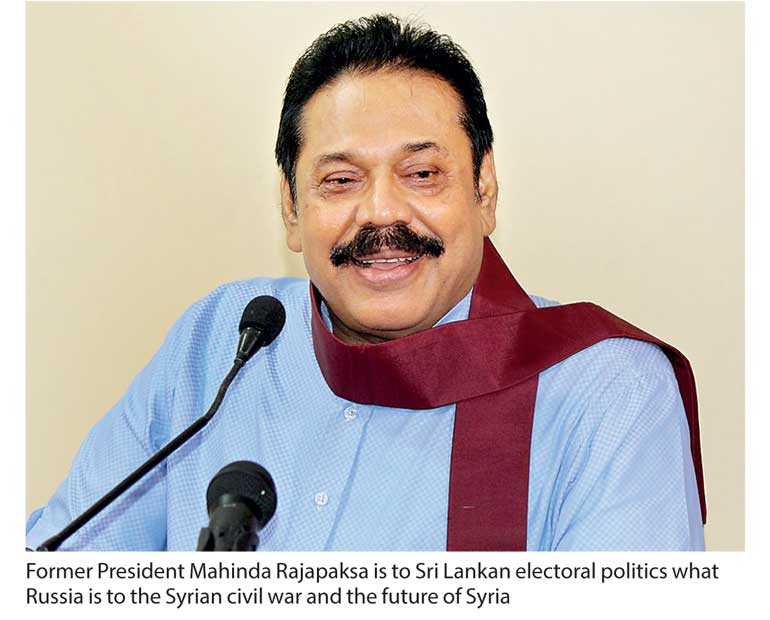Friday Feb 13, 2026
Friday Feb 13, 2026
Wednesday, 25 April 2018 00:00 - - {{hitsCtrl.values.hits}}

 It’s the arithmetic, stupid! A no-confidence motion against the Leader of the Opposition, R. Sampanthan, is logical and legitimate, neither because he is a Tamil nationalist nor because he propped up Ranil in the no-faith motion on the bond scam, but because he, unlike his TULF predecessor in the same post, Amirthalingam, by no means commands the largest number of seats in the Opposition benches, while Mahinda Rajapaksa does.
It’s the arithmetic, stupid! A no-confidence motion against the Leader of the Opposition, R. Sampanthan, is logical and legitimate, neither because he is a Tamil nationalist nor because he propped up Ranil in the no-faith motion on the bond scam, but because he, unlike his TULF predecessor in the same post, Amirthalingam, by no means commands the largest number of seats in the Opposition benches, while Mahinda Rajapaksa does.
Talk to anybody on the street. Listen to anybody in the agora, the public space/s. Citizens talk to me because they recognise me from my fortnightly Sinhala language TV show on Sirasa and my interviews in the Sinhala newspapers. They are sick to the pit of their stomach. They are disgusted, frustrated, and mad as hell; gritting their teeth, clenching their fists and waiting for the chance to end it.
They feel they were swindled in 2015. The mood among the majority of the citizens is radical, militant. It is radical in a populist sense. I find myself trying to defend the ‘SLFP Sixteen’ from youngsters who respond “did it take all this time for them to figure out that this Government was bad?” What there is, is a mounting intolerance of the 2015 political Establishment and power elite.
The SLFP’s CBK faction is busy stitching itself up as the shortened tail of the UNP elephant. The only ‘new look’ the dying ‘Unity’ Government will sport is that of embalming.
We know who loses at the end of this story. Even if there is a change in the UNP leadership, that party can reduce the margin of defeat, but a party which has not produced a President for almost a quarter century, may be out of that office for quite a while longer.
Meanwhile the JO-Pohottuwa is plainly not of one mind as to whether the JVP’s 20th Amendment should be conditionally supported.
The Yahapalana strategists hope to tempt MR into supporting abolition and then double-cross him in the final reel. Almost all in the JO would prefer Mahinda as the country’s ‘once and future’ leader but many would also stop short at the thought of supporting a move to abolish the Presidency and flatten the apex of the system to bring it within his reach, because many in the JO correctly suspect a UNP-TNA-JVP booby-trap within the ‘abolition’.
The JO senses that the UNP-JVP-TNA ‘reform’ would be rigged to target/neutralise the Rajapaksas as a collective, thereby decapitate the Opposition and keep the January 2015 outcome going by any means necessary. This is why Vasudeva Nanayakkara who is no fan of the Executive Presidency, also has no intention of falling into the JVP’s trap!
Of course there is a problem for the Opposition and within it. But that problem is not with the likeliest or most suitable personality as candidate at a presidential election. It is with a segment of his constituency. However, a problem with a segment of a potential candidate’s constituency cannot be a decisive factor in opting for a candidate! Nor can it be a reason for flattening a political system so that a candidate with such a sub-constituency within his coalition cannot contest!
Any candidate with a Sinhala Alt-Right support base within his constituency could raise apprehensions that the country could be plunged into a Dark Age of xenophobic, fundamentalist domination. No society can look developmentally forward and culturally backward. No East Asian society ever entered or accelerated modernity under the archaic cultural hegemony of a policy-prescriptive, mono-ethnic, mono-religious social stratum or power-elite. The East Asian leadership model is mainly secular, with national integration and rapid modernisation based upon meritocracy, eschewing ethnic or religious biases—not enshrining them!
If the Sinhala Alt-Right becomes politically and ideologically dominant in the State, there could be three violent flashpoints of conflict: an Islamic militant revolt, a Tamil Kashmir, and a far-left Southern youth rebellion. Dreams of a golden era of rapid modernisation may turn into ashes.
But these apprehensions, however fanciful are not going to stop an anti-Establishment candidate from sweeping to victory late next year. The 2015 Yahapalana experience, replete with the fraud and travesty of an Opposition which has a paltry 16 seats while the Southern opposition has over three times as many, has turned the Sri Lankan neoliberal experiment into a nightmare similar to the ‘lost decade’ that Russia spent in a Twilight Zone under Yeltsin. The Russians never want to go back there again. In Sri Lanka, the people’s backlash against neoliberal globalism and its rootless cosmopolitan elite will determine next year’s outcome.
In the terminology of my field, Political Science, the upcoming choice is between a progressive Populist government and an Alt-Right government, i.e. between a progressive, patriotic populism and a reactionary Alt-Right populism. The decisive factor will be Mahinda Rajapaksa and the leadership of the Joint Opposition, which comprises a leadership core with decades of experience in the anti-UNP struggle.
Mahinda Rajapaksa is to Sri Lankan electoral politics what Russia is to the Syrian civil war and the future of Syria. There is no outcome in which Russia is not the predominant variable—only a moron would try to bypass or neutralise it.